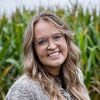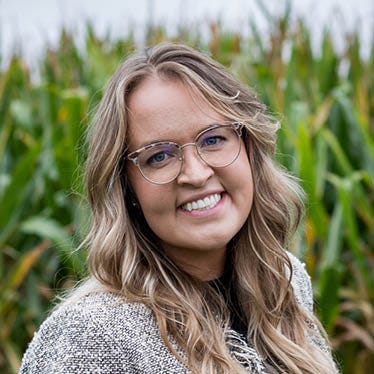March 7, 2024
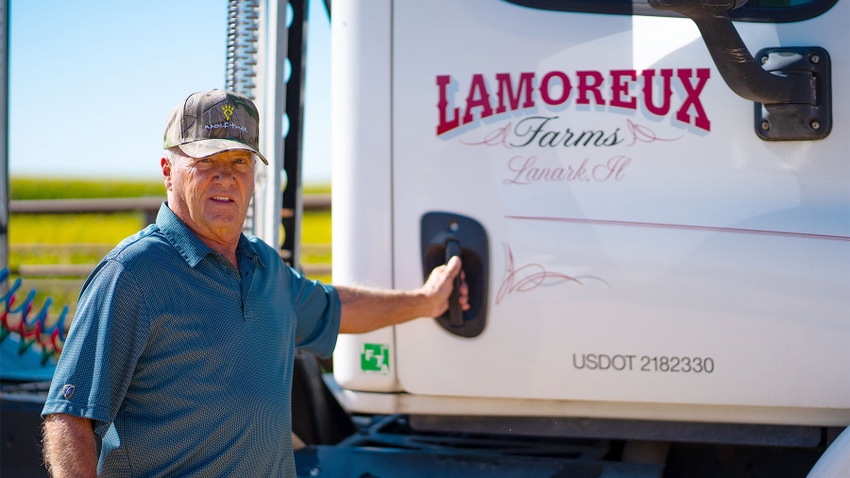
In the late 1920s, the Lamoreux farm had fallen on hard times as the farm economy began to slip. Edwin Lamoreux decided it was time to sell the farm and move to town, but his wife, Alvina, refused to sign the contract. She believed in the future of the farm and its viability for future generations.
And she was right.
Over 100 years later, the Lamoreux family’s determination has paid off, as the family still farms and lives on that same piece of land.
“Those were my grandparents,” says Lou Lamoreux of Lanark, Ill. “I often think about how different history could have been without my grandmother’s perseverance.”
Today, Lamoreux Farms is a partnership involving Lou, his brother John, his son Nathan and John’s son Dan. They feed 2,250 head of fat cattle; run a 250-head cow herd; and farm 1,900 acres of corn, soybeans, pasture, wheat and rye.
Lou’s wife, Sue, describes him as a conscientious farmer, who takes every measure to ensure the farm’s environmental and financial sustainability.
“Lou makes sure everything is done right,” Sue says. “The farm, animals and land come first. He is a good farmer and a good provider.”
This careful decision-making and determination help make Lou a 2024 Prairie Farmer Master Farmer.
The Lamoreux legacy
Lou’s career began as a teacher at Rantoul Township High School, where he taught ag for three years. In 1974, Lou returned home to farm alongside his brother John and father, Russell.
Initially, the farm had 50 brood sows that Lou developed into a farrow-to-finish hog operation. The pair also farmed 840 acres and fed 200 head of feeder cattle.
“The combination of independence and working with family always made me want to farm,” Lou says.
The Lamoreux family continued to grow the farm, adding Lou’s son Nathan and John’s son Dan to the operation after they graduated from college.
Both Lou and John have four children, and each has one son involved in the day-to-day operations at the farm. Succession has meant developing a partnership to successfully transfer assets to the next generation, while protecting Nathan and Dan as they raise their families on the farm.
“We want to be fair, but we don’t want to be equal,” Lou says. “We want to be equitable to the kids.”
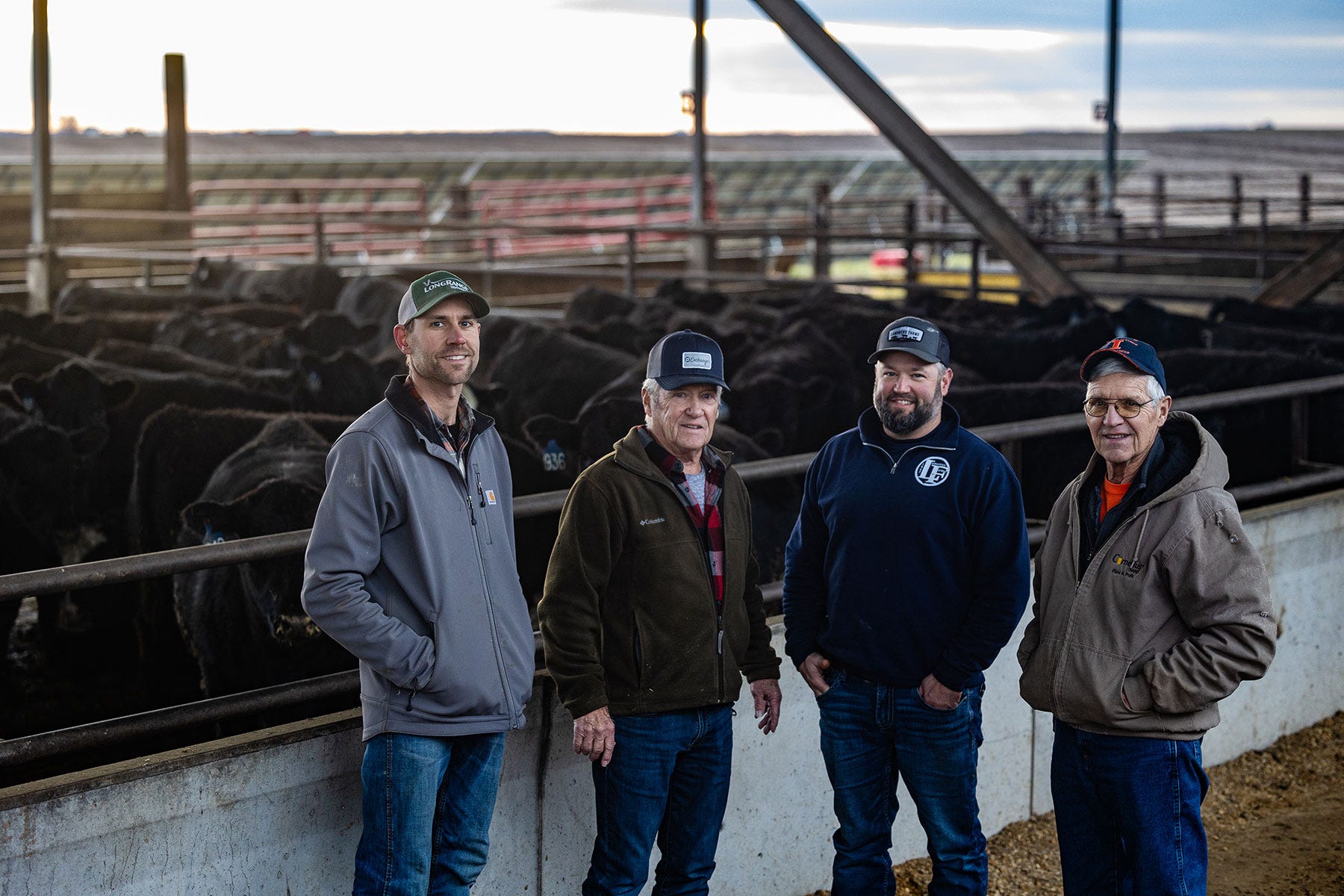
PARTNERSHIP: Lamoreux Farms is a partnership involving Lou Lamoreux and his son Nathan (center), Lou’s brother John and John’s son Dan. They feed 2,250 head of fat cattle, run a 250-head cow herd and farm 1,900 acres of corn, soybeans, pasture, wheat and rye.
Lou says his growth philosophy has never been to be a big farmer. Instead, expansion has meant diversification to bring Nathan and Dan on board, while investing in land close to their livestock.
“We were getting enough livestock that it kept us plenty busy,” Lou says. We didn’t want to drive 15 or 20 miles to farm more land when we’d have to drive back here every day to take care of the livestock.”
When Nathan was in high school, Lou noticed he took an interest in the cattle, prompting an investment in the family’s breeding cow herd.
“Lou’s dad was interested in beef cattle, then Lou and now Nathan,” Sue says. “It’s been fun to see how that passion passes from father to son as the legacy of the Lamoreux farm continues to the next generation.”
In 2018, the family built a monoslope cattle barn to house 2,250 feeder cattle. Outside of the barn sits 250 feet of solar panels that power the farm.
Striving for soil health
The conservation measures at Lamoreux Farms date back several decades to when Lou’s father began terracing, practicing crop rotation and chisel-plowing.
“My dad was big on improving the soil,” Lou says. “He understood that the soil will be here long after we’re gone.”
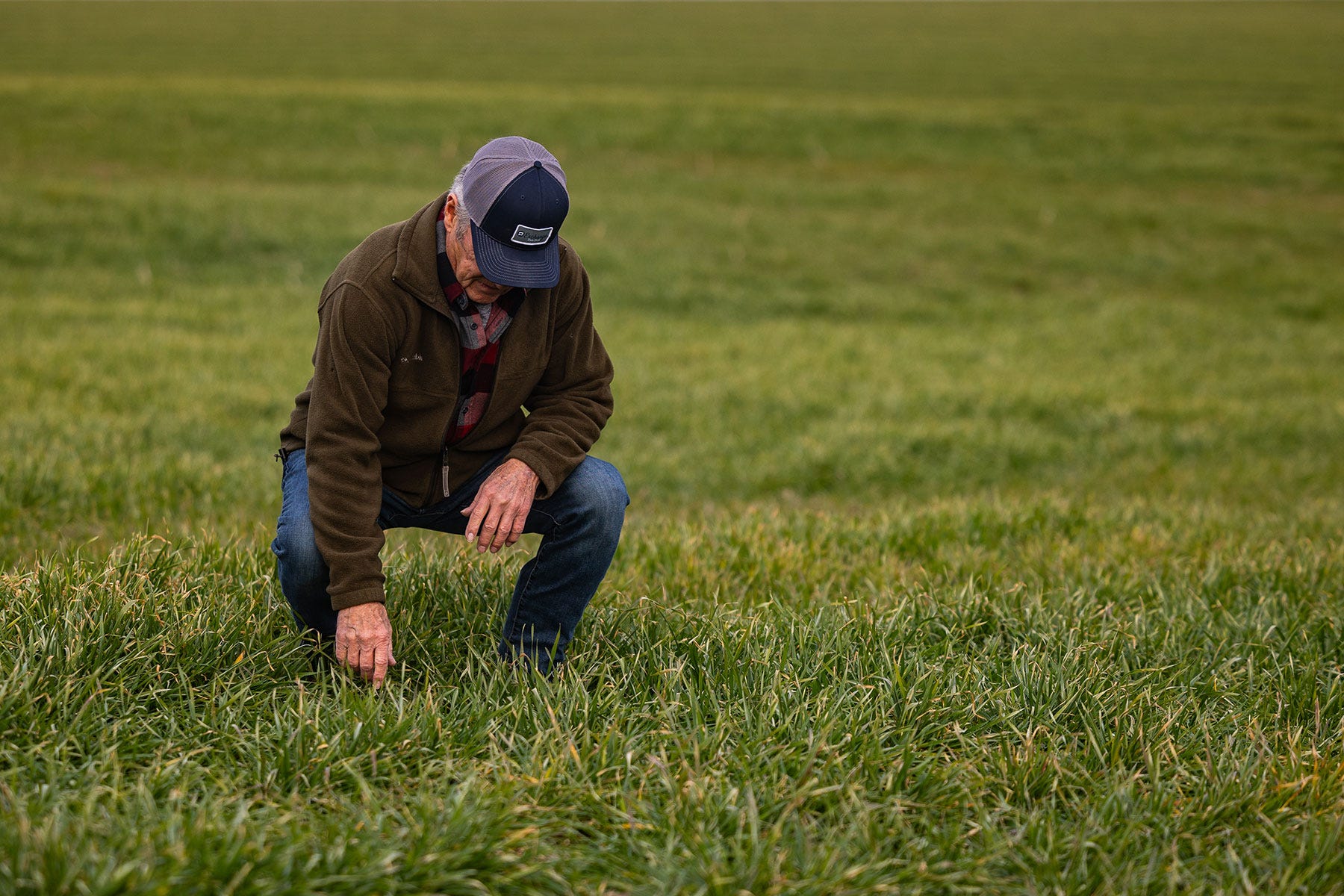
CONSERVATION: Taking care of the environment and soil have always been a priority for Lou Lamoreux. “We do what we can so future generations have good quality soil to keep the world alive. About 95% of the food grown in the world comes from the soil, so we need to maintain soil health to maintain the food supply,” he says.
Lou recalls neighbors poking fun at these early conservation practices, as deep tillage was the norm.
“John and I used to get ridiculed on the bus because everybody else was running a moldboard plow,” Lou says. “While their soil looked black and pretty, kids would say, ‘Are you guys out there with your scratcher again stirring the ground?’”
Lou has expanded on his father’s environmental measures by using manure, planting cover crops and minimizing tillage. Improving the soil has remained a priority, and Lou has been recognized for his regenerative agriculture efforts by the Illinois Farm Families coalition.
“To regenerate is to improve what we have,” he says. “We do what we can so future generations have good quality soil to keep the world alive. About 95% of the food grown in the world comes from the soil, so we need to maintain soil health to maintain the food supply.”
Learning in leadership
Lou’s leadership experience goes back to the 1970s, when he first became involved in community organizations like the Rantoul Jaycees and Lanark United Methodist Church.
“I’d like to be known as an honest and fair man who was involved in the community,” Lou says. “The motivation for involvement comes from my father — he instilled a need in me to give back.”
Over 20 years ago, Lou began to phase out of the hog business, because Nathan and Dan were more interested in producing grain and cattle. Lou saw this as an opportunity to increase his involvement in state and national commodity organizations.
“Decisions are made by those who show up,” Lou says. “Someone once told me, ‘If you’re not at the table, don’t be trying to make a statement.’ And they were right.”
Lou has served on the Carroll County Pork Producers board, IL Corn Growers Association board, IL Corn Marketing Board, Illinois Livestock Development Group board, Illinois Beef Association board, National Cattlemen’s Beef Association Federation board, U.S. Meat Export Federation board and U.S. Grains Council board.
“I’ve been on a lot of different boards, but I could only do that because of the support at home,” says Lou, crediting John, Nathan, Dan and their hired men for keeping the family farm operating while he’s away.
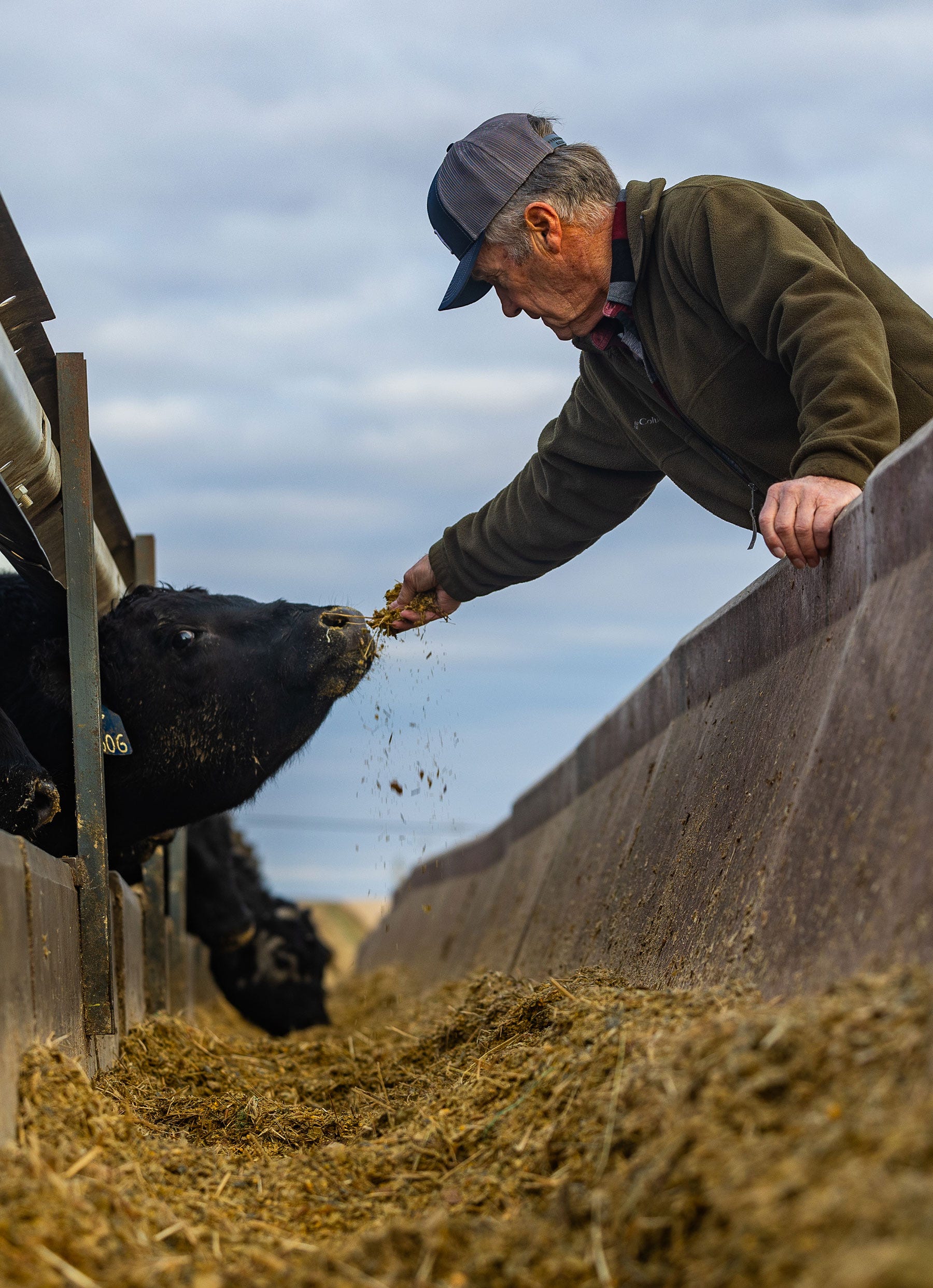
CARETAKER: “Lou makes sure everything is done right. The farm, animals and land come first. He is a good farmer and a good provider,” says his wife, Sue Lamoreux.
Exploring unconventional feedstuffs
The feed ration at Lamoreux Farms typically consists of forages, plus corn and soybean byproducts. However, Lou has also explored some unconventional feedstuffs for their cow herd and feeder cattle.
As part of Lou’s conservation efforts, he’s planted hundreds of acres of cover crops. The cows typically enjoy grazing this lush green forage, especially in the fall and winter months as green grass becomes sparse.
When Lou planted his first radish cover crop, he wasn’t sure what the cows would think.
“The cows pulled out each radish by the top,” Lou recalls, and he speculated that they wouldn’t eat the radishes themselves. “Big, white radishes covered the field for about three days until, sure enough, one day the cows had eaten them all.”
Lou also has used expired produce from neighboring grocery stores in his feed ration. Every week, produce was delivered, and they factored it into their total mixed ration. The cattle would anxiously await its delivery.
“It was like candy to them,” Lou says. “When that shipment of fruits and vegetables pulled up, the cattle would go wild — they loved it. We found that about the only thing they won’t eat are jalapeños and coconuts.”
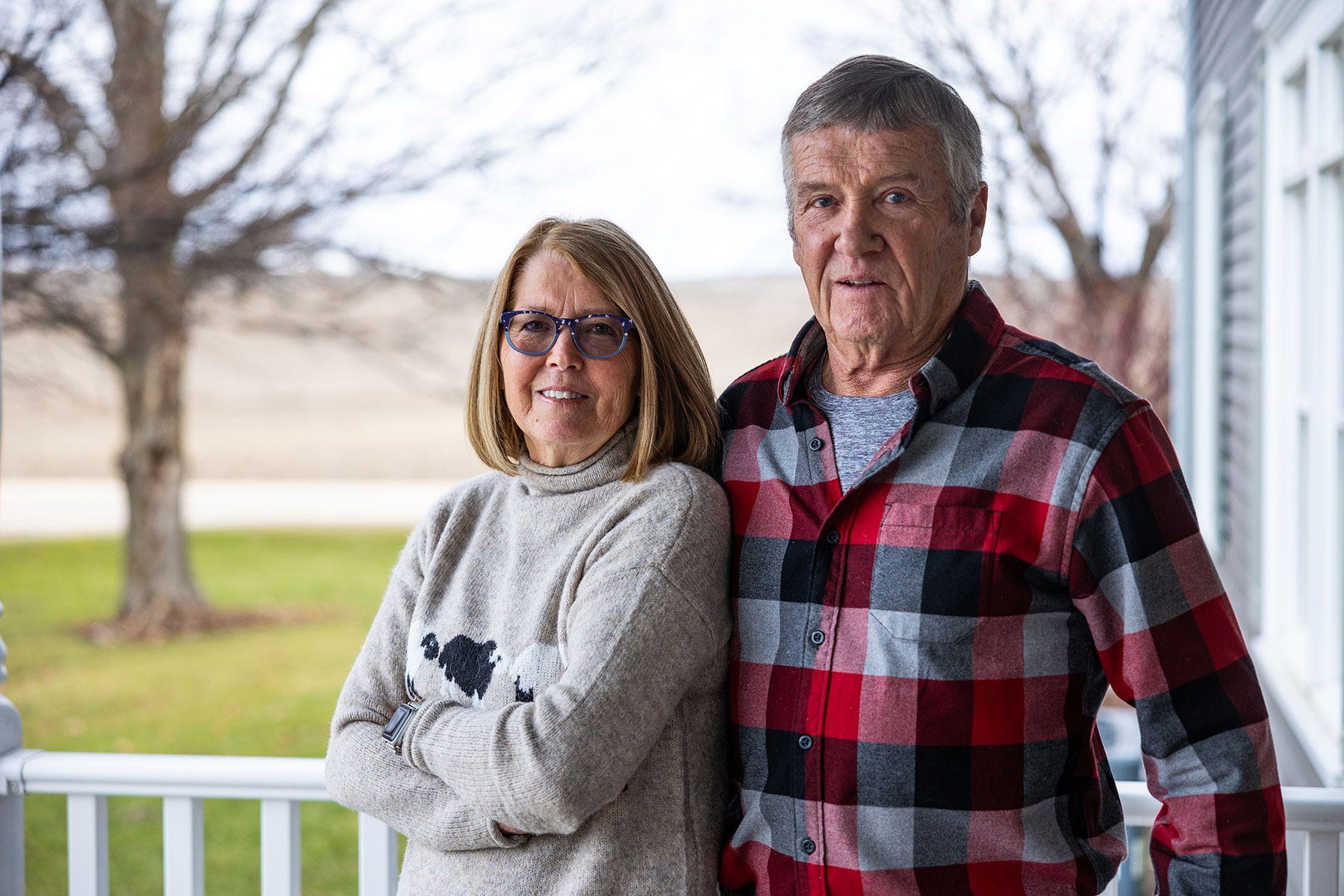
MARRIAGE: Lou and Sue Lamoreux have been married since 1971. The pair have four children and 15 grandchildren.
Master at a glance
Lou Lamoreux
Wife: Sue
Children: Calli Curtis, Cara Griffith, Nathan Lamoreux, Zachary Lamoreux
County: Carroll
Operation: 1,900 acres of corn, soybeans, wheat, forage and cover crops; 2,250 head of finisher cattle; 250 head of cows
Leadership: Carroll County Farm Bureau president; Carroll County Pork Producers president; ICGA board; ICMB chairman; IBA board, vice president and checkoff chair; NCBA Federation board; ILDG board; Illinois Farm Families volunteer; USMEF executive committee; USGC delegate; Carroll County Board director; Lions Club president; Lanark United Methodist Church trustee; Eastland School Advisory; Lanark High School assistant football coach; Rantoul Jaycees chairman
Nominator: IL Corn and Illinois Beef Association
Read more about:
Master FarmersAbout the Author(s)
You May Also Like

